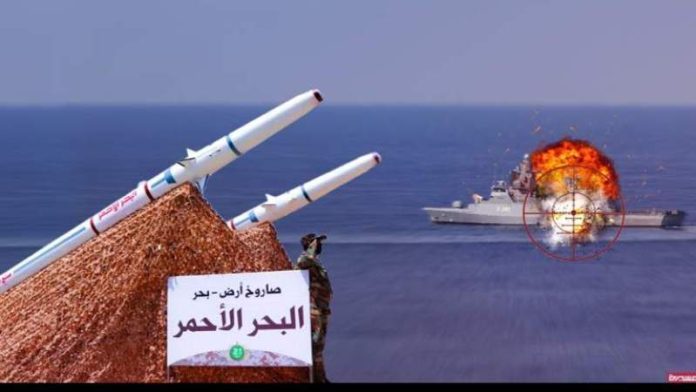The American defense-focused website 19FortyFive reported that the U.S. military suffered a significant defeat in the Red Sea by the Yemeni Armed Forces.
The site explained that Yemeni forces successfully blocked access to the Red Sea through their innovative use of long-range precision missiles and cost-effective drones. It described Yemeni operations as one of the most pivotal turning points in military history.
The report suggested that the U.S. military could benefit from adopting tactics used by Yemeni forces, which demonstrated that controlling the sea from land and denying access can be highly effective. It highlighted the Yemenis’ success in reshaping warfare strategies.
The article elaborated that Yemen’s strategy includes controlling the sea and denying access by deploying long-range precision missiles and autonomous drones launched from land. It noted that Yemeni forces effectively combine ballistic anti-ship missiles, cruise missiles, and one-way attack drones to compete for control over maritime communication lines along the Red Sea coast.
By spotlighting the Yemeni military’s successful operations and its groundbreaking tactics for controlling seas from land, 19FortyFive urged the U.S. military to draw lessons from Yemen’s strategies in preparing to confront China.
The report pointed out that the U.S. Army’s medium-range strategic missile program and multi-domain task forces are well-suited for adopting similar tactics in the Western Pacific to counter China.
It suggested that the U.S. military could align such tactics with its current initiatives, such as the Navy’s distributed maritime operations concept, where ships operate widely yet in coordination. Similarly, Army units could adopt this approach in the Western Pacific.
The article emphasized that in a maritime war in the Western Pacific, the Army would likely need to operate from remote island bases and attack ships in ways similar to Yemeni armed forces. Geographical dispersion, it argued, would be crucial for survival in future conflicts.
The site concluded that Washington and its allies could gain a significant advantage in reshaping the trajectory of war by learning from the Yemeni approach of sea control using low-cost drones and long-range precision weapons. Combining these tactics with aerial mobility could prove transformative in future military strategies.
Yemen has declared open support for Palestine’s struggle against the Israeli occupation since the regime launched a devastating war on Gaza on October 7, 2023, after the territory’s Palestinian resistance movements carried out Operation Al-Aqsa Storm against the occupying entity.
The Yemeni Armed Forces have said they will not stop their attacks until Israel’s ground and aerial offensives in Gaza end.
So far, Israel has killed at least over 44,000 Palestinians, mostly women and children, and injured over 104,000 others in Gaza.




















